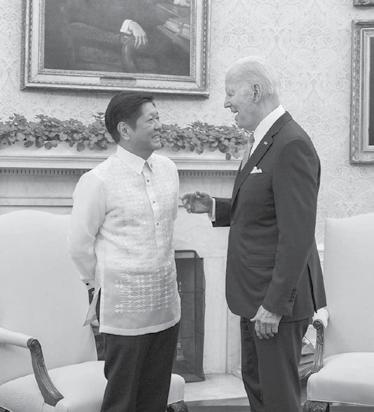
2 minute read
US-PH relations bring in real investments

embassy.
Advertisement
United States have been surging.
WE celebrated the 125th year of Philippine Independence in Washington, D.C. with a record crowd composed of business people, colleagues from the diplomatic circle, members of the Filipino-American community and officials from the U.S. government, with White House National Security Advisor Jake Sullivan as our guest of honor.
The upbeat atmosphere reflected the vibrant and dynamic relationship between the Philippines and the United States which, if I may say so, is at the best it’s ever been. While relations with our close and only defense ally have been at times complicated, the ties that bind our two nations have remained solid over the decades. As President Ferdinand Marcos Jr. accurately stated – our relationship with the United States is an evolving one that will continue to strengthen through more robust economic and people-to-people ties. There is no doubt the deepening bilateral ties between the U.S. and the Philippines as well as our good relations with like-minded nations have put us under the radar of American companies that now see the Philippines as a safe investment choice.
Less than a year into President Marcos Jr.’s presidency, investments coming from the
Of the over $5 billion in pledges from U.S. firms engaged in a wide range of businesses, $2 billion in actual investments have been confirmed by our DTI. In August 2022, President Biden signed the Creating Helpful Incentives to Produce Semiconductors and Science (CHIPS) Act to diversify the source of semiconductor wafers which the Philippines imports for the assembly, testing and packaging of chips. The CHIPS Act also created the International Technology Security and Innovation Fund that provides the State Department with a separate funding of $500 million ($100 million a year for five years starting in Fiscal Year 2023)
“to promote the development and adoption of secure and trustworthy telecommunications networks and ensure semiconductor supply chain security and diversification.”
We were informed by the State Department that the Philippines is among the countries that have been identified by the U.S. with which they want to partner in the semiconductor supply chain.
Companies that have been in the Philippines for many years are also gearing up for expansion, like Procter & Gamble that will open an additional plant to increase its manufacturing line to cater to both domestic and export markets. For the IT-BPM sector, Optum is establishing two locations in the Philippines for its BPM services while for logistics,
Fedex is expanding its delivery services facility to 10 times bigger than its mid-Pacific hub. For telecommunications –considered a critical global economic sector – we have Starlink that is now operational in the Philippines, the first in Southeast Asia. The U.S.Transpacific Jupiter Cable system is now also up, connecting the Philippines directly to Japan and the U.S. West Coast.
Another important sector is health care, and I am very pleased that Moderna – whose very effective mRNA anti-COVID-19 vaccines saved so many lives all over the world, including Filipinos – will set up one of three worldwide Enterprise Solutions Hub and commercial operations in the Philippines to service the Asia Pacific market.
These investment pledges from the U.S. are no pie in the sky promises; these are real dollars that are coming in.
Let me be clear: We are carrying out President Marcos’ instructions to all Philippine ambassadors – that is, to promote goodwill in our host country; bring in more investments and generate more jobs for Filipinos. As Ambassador to the United States, I will unequivocally continue to do just that, which is to keep good relations with our one and only defense treaty ally – the United States.
* * * My sincere congratulations to Rigoberto Tiglao for his recent award from the Chinese







